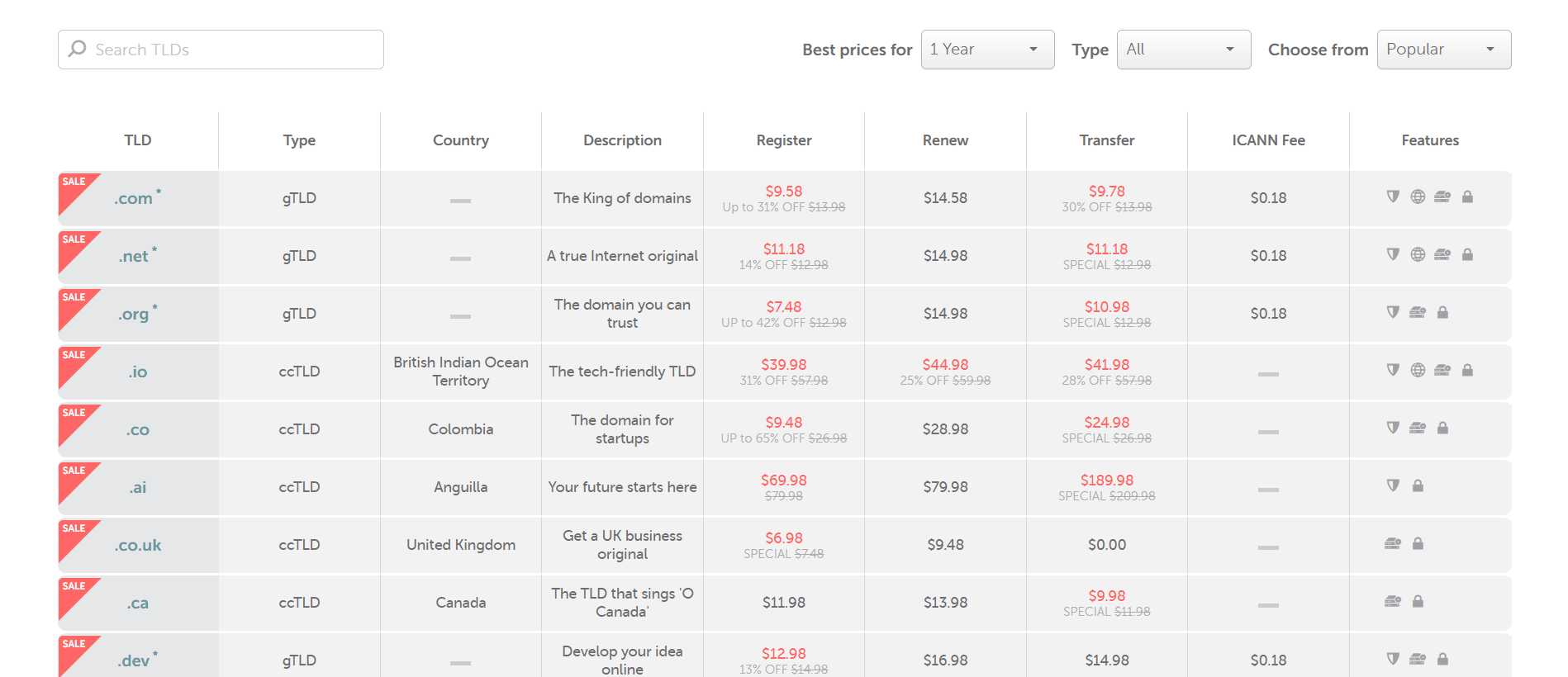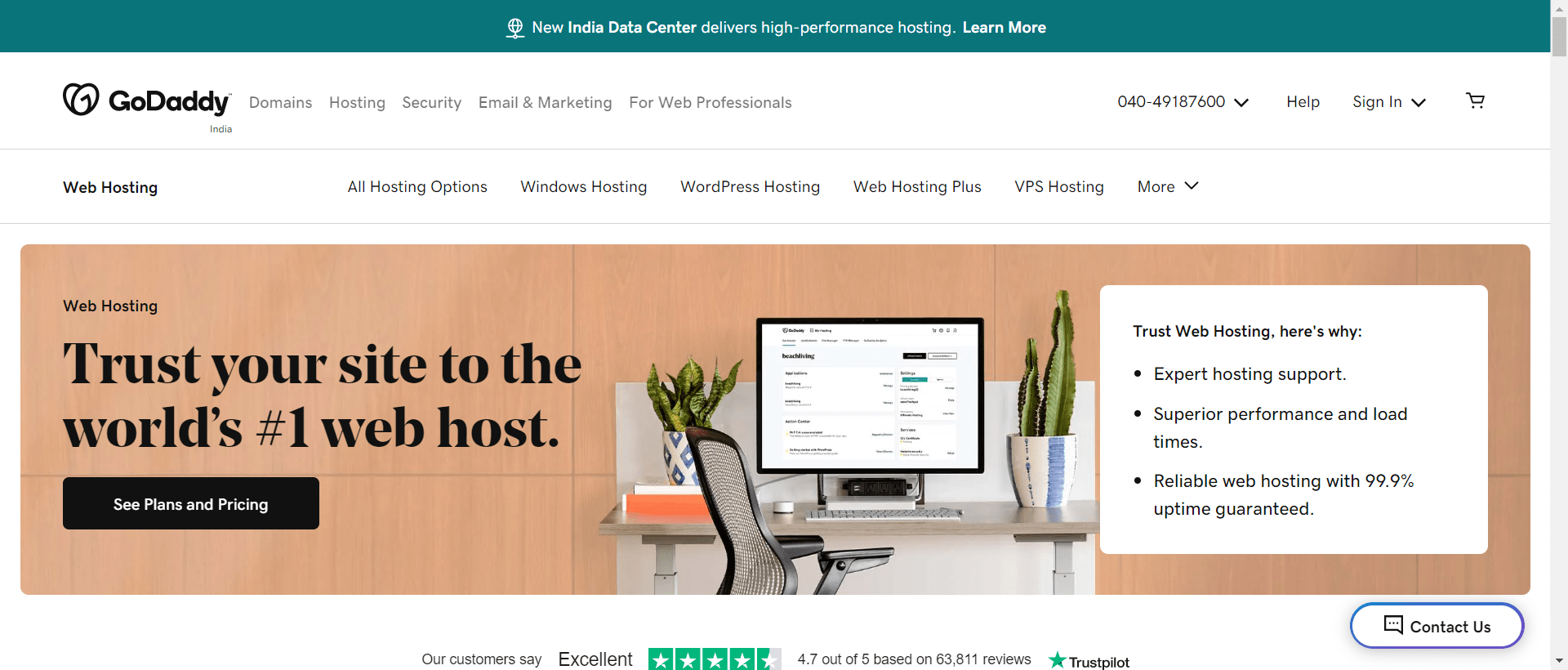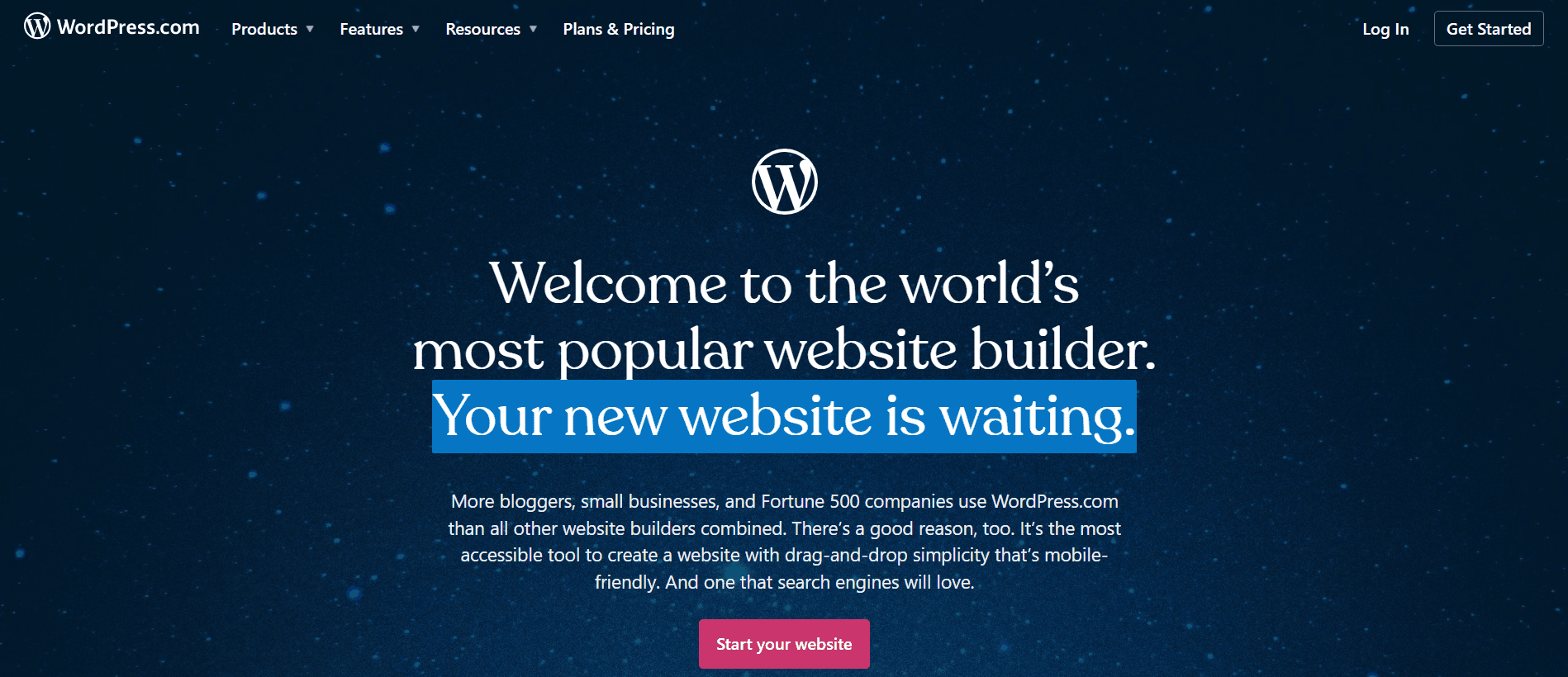Are you a real estate agent looking to increase visibility and leads through your website? An IDX (Internet Data Exchange) website can be the perfect solution for you! With an optimized, integrated program designed to inject MLS (Multiple Listing Service) listings directly onto your site in a stylish format, IDX websites appeal to prospective buyers by presenting accurate, up-to-date results in organized searches.
By following these steps for building an effective IDX real estate website, you can ensure your page looks professional and drives quality traffic that will convert into better sales.
#1) Register your domain name
Registering a domain name for your real estate website is an important first step in creating a successful online presence. It is a crucial part of the overall branding experience, and it helps solidify your website’s identity in the minds of visitors and potential customers.
The process of registering a domain name should begin with research. You want to choose a domain name that reflects the nature of your business, as well as being descriptive and easy to remember.
You should avoid using hyphens or numbers, as these can be harder to recall and could confuse people when they try to find your site. You will also need to ensure that the domain name you choose is available; if it has already been taken, you may need to look at alternative options until you find one that’s suitable.
When you have decided on the perfect domain name, you can head to a registrar such as GoDaddy or NameCheap and proceed with registration.

This involves providing personal information such as your contact details, payment information, and so on. Once this is complete, you will be able to confirm that your chosen domain name has been registered successfully; many registrars also provide additional services such as web hosting and email addresses associated with the new domain name.
It’s important to remember that registering a domain does not automatically guarantee success for your real estate website; however, it is nevertheless an essential element in creating an effective online presence.
Taking time to research different options before selecting one will help ensure that you select a suitable option that gives visitors the ideal first impression when viewing your site – thereby increasing their chances of making contact or enquiring about properties on offer.
#2) Choose Web hosting plan
When creating a real estate website, one of the most important decisions you will need to make is selecting a web hosting plan that best suits your needs. Choosing the right web hosting plan can have a major impact on how successful your website is, as it affects aspects such as speed, security, scalability, and functionality.
If you’re using an IDX system, then you’ll want to select a hosting plan with sufficient storage and RAM space to store all of your indexed data from multiple locations in an efficient manner.
You should also consider the type of platform that you’re going to be running on – if you choose WordPress for example, then you may want to opt for a managed WordPress hosting plan so that all the technical aspects are taken care of by the host.
To ensure optimal performance and uptime for your website, look for a hosting provider that offers server-level caching options such as Memcached or RedisCache which can help reduce page loading times and increase responsiveness on high-traffic websites.
Additionally, certain providers offer advanced features such as proactive malware scanning and malware removal tools which can help protect your website from malicious attacks and keep it secure at all times.
Another key factor when choosing a web hosting plan is scalability; having the option to upgrade or downgrade according to demand is essential when running any kind of website but particularly those with heavy data requirements such as an IDX real estate site.

Most hosts offer various levels of plans so make sure to assess exactly what capabilities each one offers in terms of storage space, bandwidth and processing power before deciding on which one is best suited to your needs.
In conclusion, selecting the right web hosting plan for an IDX real estate website is vitally important if you wish for it to be successful. You should take into account factors such as storage capacity and scalability when making your decision in order to ensure that your website performs optimally at all times.
#3) Install WordPress (or other site builder)
Installing WordPress (or other site builder) is an important step in the process of creating a successful real estate website with IDX integration. While there are many site builders available, WordPress has emerged as one of the most popular solutions for real estate websites due to its easy-to-use interface and wide range of features.

The first step in installing WordPress is to select a web hosting provider. There are many options available, ranging from free shared hosting services to premium dedicated servers.
Make sure you choose the correct option for your website’s needs – if you’re unsure which is best for you, contact your web host or seek advice from experienced professionals. Once you have chosen a web host, you should be able to log in and access their control panel for installation.
Next, visit the WordPress website and download the latest version of their software package.
Once downloaded, extract the files and upload them to your web host’s server using FTP. To complete the installation, simply follow the instructions provided by your host – typically this involves entering some basic information such as an administrator username and password.
For a truly comprehensive real estate website experience, it’s important that you install additional plugins and themes beyond those provided by WordPress out of the box.
These allow you to customize your website design with unique looks and add extra features such as searchable property listings or image galleries with slideshows – all of which will make your site more appealing to potential buyers or sellers.
Finally, it’s worth noting that when installing WordPress (or another site builder) for a real estate website, it’s recommended that you also install an SSL certificate – this will encrypt communication between your server and users’ browsers so that any sensitive data remains secure during transmission over the internet.
#4) Design and add features to your site
Designing and adding features to your real estate website is essential in order to build a successful IDX (Internet Data Exchange) site. Having a well-designed and feature-rich website can help you attract more buyers, generate more leads, and ultimately increase the ROI for your business.
The design of your real estate website is the first impression potential buyers will have when they come across it. Therefore, it’s important to spend time creating a visually appealing design that captures the attention of viewers, while also making sure it’s easy to navigate so users can quickly find what they’re looking for.
This can be done by incorporating elements such as high-quality images and videos, incorporating colors that match your branding, utilizing white space effectively, and including intuitive navigation menus.
When it comes to adding features to your site, there are a variety of available tools that can help you create an interactive experience for visitors.
For example, you could add a “search by map” tool which allows potential buyers to easily search for properties in their area. You may also want to include an IDX plugin that allows visitors access to detailed listings directly from the MLS (Multiple Listing Service).
Additionally, providing blog content related to news updates or local market trends can be beneficial in attracting viewers who may not initially have been interested in purchasing real estate but will become more engaged after reading about updates or trends in their area.
It’s also important to consider having contact forms on each page of your site so visitors have the ability to submit inquiries without having to leave the page they’re viewing—this is especially helpful if they find something they like but need more information before making any decisions.
Incorporating social media links can also be useful; this gives visitors a chance to learn more about you and interact with you on various platforms—allowing them to get a better feel for you as an agent before contacting you directly.
By investing time into designing an aesthetically pleasing website and adding features such as search tools, IDX plugins, blog content, contact forms, and social media links.

You should be able to create a successful IDX Real Estate Website that will attract more buyers and increase leads which ultimately leads higher returns on investment for your business!
#5) Add IDX powered listings (if applicable)
Adding IDX-powered listings to your real estate website can be a great way to increase the value of your online presence. With the help of an innovative and reliable integrated data exchange (IDX) provider, you can access MLS listings directly from your website with just a few clicks.
This will allow you to quickly and easily display property information that is up-to-date and accurate, resulting in more leads for your business.
In addition to simply providing a way for customers to view current properties, an IDX-powered website can also improve website performance by reducing page loading times.
IDX providers often offer hosting services as well, so you won’t need to worry about maintaining the server or software yourself. This makes it easy for you to focus on marketing, driving web traffic, and increasing customer conversion rates.
When integrating a third-party IDX solution into your real estate website, it’s important to consider how quickly and seamlessly the technology works with other features such as search filters or contact forms.
Doing this kind of research beforehand will save time in the long run and ensure that you have an effective site that has everything users need in order to find their dream home in no time. Additionally, make sure that any contact information collected through lead forms is secured safely and kept confidential, as this is essential for meeting privacy regulations such as GDPR or CCPA.
Finally, make sure that any visuals used on the website are high quality and accurately reflect the content they’re being used to promote.
For example, high-resolution pictures of properties or areas can help visitors get a better understanding of what a particular property looks like before deciding whether or not it’s right for them.
Visuals can also be used in conjunction with written descriptions or reviews from other customers to further demonstrate why a certain listing could be perfect for them too.
Overall, adding an IDX-powered listings feature to your real estate website provides numerous benefits including faster page loading times, improved user experience, enhanced search capabilities, and much more – all designed to increase traffic and sales from potential buyers searching for their ideal property online!
#6) Add content and other value services
When it comes to building a successful real estate website, utilizing IDX can be key. IDX stands for Internet Data Exchange and allows real estate agents to bring live listing data from the MLS (Multiple Listing Service) onto their websites.
With the right IDX integration, real estate agents are able to showcase listings from different MLSs, while also providing a more seamless user experience for potential buyers.
One of the most important aspects of any successful website is content. Content can include blog posts, property descriptions, mortgage calculators, community info sheets, and much more. This content allows potential buyers to get an in-depth look at the properties on your site as well as gain useful information about the area and its amenities.
This type of content can really make a difference when it comes to driving traffic and converting leads into sales.

By adding value services such as virtual tours or 3D walkthroughs you can give buyers even more insight into what your properties have to offer without them having to physically visit the property.
Offering virtual tours or 3D walkthroughs that are easy to use helps create a more positive user experience which makes it easier for potential buyers to explore all of your listings with ease.
In addition to content and value services, utilizing search engine optimization (SEO) techniques is essential in helping your website be found online by those looking for real estate in your area.
Using relevant keywords throughout your content will make sure that prospective buyers searching online will find you first before they look elsewhere. Optimizing titles, descriptions, meta tags, and images will ensure that you are visible across multiple platforms and devices making it easier for people looking for real estate in your area to find you quickly and easily without getting lost in other sites or listings.
Building a successful real estate website is easier said than done but with the right tools like IDX integration combined with high-quality content and value services such as virtual tours or 3D walkthroughs along with optimized SEO strategies you’ll be on your way to achieving success in no time!
#7) Market your real estate website
Marketing your real estate website is essential for drawing attention and engagement from potential homebuyers. It’s the key to tapping into a larger pool of prospects, as well as generating more leads and conversions. To do this successfully, it’s important to understand how IDX real estate websites work, what they are designed to do, and how they can be used to build an effective online presence.
First of all, it’s important to recognize that IDX stands for Internet Data Exchange – a term used to describe the sharing of data between different websites. This means that when a potential homebuyer visits your real estate website, they may be able to view listings from other sources that are made available through the exchange of data.
Therefore, it is beneficial for you to ensure that your website is connected with as many other sites offering listings as possible in order for your audience to have access to comprehensive information about a property available throughout the market.
In order to maximize exposure and engagement from visitors, you should take advantage of SEO (Search Engine Optimization) techniques such as backlinks and content optimization.
Linking your website with popular websites or blogs related to real estate will help boost its search engine rankings; creating quality content showcasing available properties in an informative yet engaging manner will also help draw viewers’ attention and make them want to come back for more.
Additionally, optimizing titles and meta descriptions on each individual page helps increase click-through rates which directly impacts visibility on search engine results pages (SERPs).
Social media platforms like Facebook, Twitter, and Instagram provide powerful tools for promoting your real estate business online.
Setting up profiles on these platforms allows you to share relevant content with broad audiences in a matter of minutes—giving potential homebuyers even more reasons visit your website. Additionally, social media pages can be used as vehicles for increasing overall brand awareness by leveraging advertising campaigns or contests based around the industry’s trending topics or current events.
Finally, one last key technique that should not be overlooked when developing an effective marketing strategy for a real estate website is email marketing.
By using automated systems such as MailChimp or Constant Contact you can reach out directly with customized messages about new listings or special offers straight into inboxes of existing contacts or prospects gathered onsite via web forms or opt-in services like OptinMonster; prompting them to return again soon or making contact automatically at predetermined intervals if desired.
Overall, marketing a successful IDX real estate website requires understanding how different types of techniques work together—and learning how best you can utilize each one—to create an attractive platform capable of reaching out further than ever before while still providing useful information in an engaging way.
With the strategic implementation of SEO tactics plus social media outreach combined with email campaigns may prove fruitful in attracting new leads and potentially converting them into satisfied customers over time—allowing you to take advantage of this technology while connecting with prospective buyers quickly where they are most likely looking!
Also Read:
Conclusion
While there are many important components to a successful real estate website, by following these steps you will be on your way to creating a site that not only looks great but also functions well and ranks high in search engine results.
Keep in mind that an effective real estate website is an ongoing project that should be continually updated and improved–but following these tips will give you a strong foundation on which to build.


